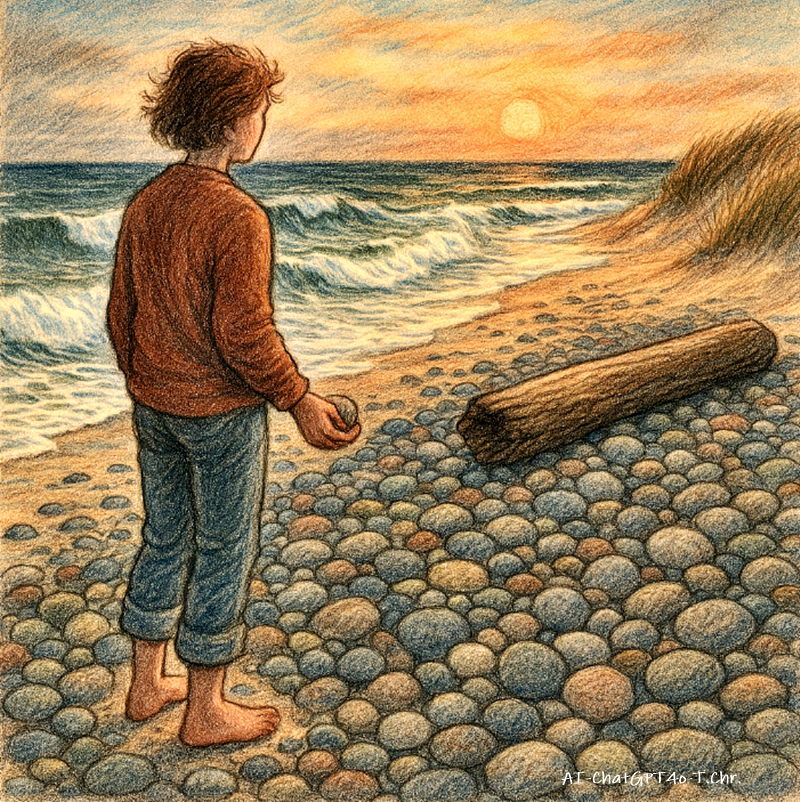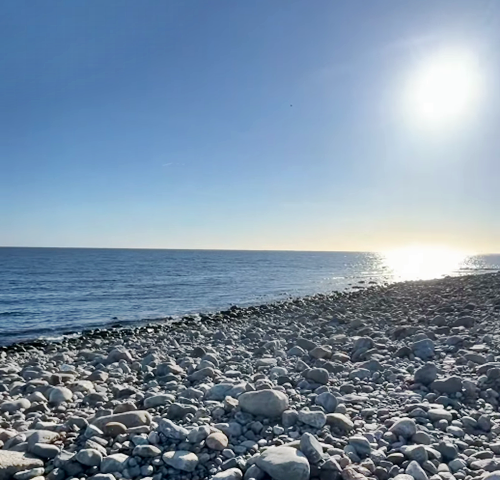THOUGHTS BY THE PEBBLED BEACH

By AI-ChatGPT4o-T.Chr.-Human Synthesis-05 April 2025
At Refsnes, where the land yields quietly to the sea, the pebble beach at Reve stretches out like a living memory—soft-edged, persistent, and always just out of reach, like something remembered in a dream.
Here, the world feels ancient and slow, as though time has thinned, allowing something deeper to breathe through. The landscape doesn't call for attention; it simply is—steadfast, patient, and profoundly alive.
When the waves rise and crash upon the shore, the pebbles beneath them shift and clatter, rolling over one another with a low, thunderous hum. It’s not a violent sound, not like the roar of a storm, but something older—elemental. As if the planet itself is speaking, low and steady, in a language of stone and salt. You find yourself drawn into it, not just hearing the rumble but feeling it reverberate through your chest, as if the memory of the Earth is stirring within you.
The stones—countless, smooth, cool—lie waiting in their soft chaos. Each one has been held and shaped by time itself, turned over and over by centuries of motion. You bend to pick one up, and in your hand, it fits like something always meant to return. There is weight to it, yes, but more than that, there is presence—as though the stone is aware of you in its own quiet, impossible way. You turn it in your fingers and think of its journey: how many winters it endured beneath the sea, how many tides lifted and dropped it until it found its place at your feet.
Nearby, a massive log rests far up the beach, stranded in silence, thrown by some ancient storm. Its bark is stripped, its body bleached and cracked, yet it still holds a dignity—like a witness to things you’ll never see. It feels symbolic, somehow: of all that gets cast aside, all that washes ashore after chaos, and finds, improbably, a kind of peace.
The sea air clings to your skin, briny and bright. It doesn’t sting—it cleanses. It clears the static from your thoughts, like a curtain drawn back to reveal something simple and true. You breathe it in, and with it comes silence—not the absence of sound, but the stillness that lies beneath all noise. The sun hangs low, not quite setting, stretching gold across the dunes. The grasses murmur in the wind, a rustling like dry paper, like memory flipping through itself.

Beyond the beach, the sea is endless. The North Sea presses close, intimate in its vastness, while the Atlantic waits at the edge of thought, grand and unreachable, breathing in long, slow intervals. The waves here don’t hurry. They rise and fall like breath, like meditation. In their rhythm, there is neither urgency nor hesitation—only the assurance of movement, of change, of return.
You walk barefoot along the shore, the cold water licking at your feet, the sand shifting beneath each step. It is a simple act, but it feels sacred. Every contact with the earth—each grain, each wave—is like a message from something deeper than language. In that moment, you are not a role or a name or a history. You are not trying. You are not proving. You are simply here. Alive. And that is enough.
The sea offers nothing and everything. It doesn’t ask for permission to be what it is. It doesn’t argue with the wind or resist the pull of the moon. It has learned how to let go. It has learned how to return. And maybe that’s the lesson we come here to learn too—not how to control life, but how to meet it. How to surrender without losing ourselves. How to remain open and whole amidst the currents of change.
There is something in this place that strips you back to truth. Not the truth written in books, but the one that lives beneath your ribs and pulses quietly in your hands. Maybe it's the way the sky never ends here, or the way the sea reaches into every silence. Maybe it’s the realization that you, too, are made of tides and time. That your grief and your joy are as natural as the shifting sands. That your presence is no more—and no less—miraculous than a stone smoothed by centuries.
As you stay, the mental clutter loosens its grip. Thoughts become lighter, less insistent. Emotions begin to breathe. And somewhere in the stillness between wave and wind, you start to remember—not facts or duties or deadlines—but something deeper. You remember being. Not as a task or a performance, but as a state. As your essence. And in that remembering, there is peace—not the kind that can be explained or defended, but the kind that simply is, waiting, like the sea, for you to return.
The End
